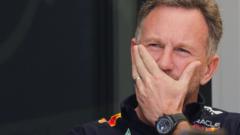What Led to Horner's Downfall at Red Bull?

Understanding the Shifting Dynamics at Red Bull Racing: The Departure of Christian Horner
In a shocking turn of events, Christian Horner's removal from Red Bull Racing, following Max Verstappen's fifth-placed finish at the British Grand Prix, marks a significant departure for a team that has dominated Formula 1 in recent years. While the announcement may seem abrupt, the underlying causes have been simmering for at least 18 months. This article delves into the multifaceted reasons behind Horner's exit, examining the internal struggles, performance declines, and strategic missteps that ultimately led to his dismissal. By understanding these dynamics, fans and analysts can gain insights into the future of Red Bull Racing and the challenges it faces as it navigates a new era.
The Legacy of Christian Horner
Christian Horner's tenure as team principal has been nothing short of remarkable. Leading Red Bull Racing for two decades, he has been pivotal in establishing the team as a powerhouse in Formula 1. Under his stewardship, Red Bull clinched multiple Constructors' and Drivers' Championships, with Verstappen being a standout performer. However, the recent downturn in performance raises questions about Horner's leadership and decision-making skills, especially as the team struggles to maintain its competitive edge.
The Catalyst for Change: Allegations and Internal Struggles
Horner's challenges began to escalate in February of last year when allegations of sexual harassment and coercive behavior surfaced against him. Although internal investigations cleared him of wrongdoing, the cloud of controversy added pressure to an already volatile situation. The atmosphere within the team became increasingly fraught with tension, as internal power struggles and disagreements regarding car and driver decisions came to light.
Power Struggles and Departures
In the wake of co-owner Dietrich Mateschitz's death, Horner began to assert his influence within the organization. However, this led to friction with Helmut Marko, the long-time motorsport adviser and confidant of Mateschitz. Reports indicated that Horner attempted to sideline Marko, leading to a power struggle that persisted until early 2024. During this tumultuous period, Verstappen publicly supported Marko, making it clear that his departure would lead to his own exit.
Meanwhile, Horner also faced challenges within the design department, particularly between chief technical officer Adrian Newey and technical director Pierre Wache. As tensions escalated, Newey ultimately resigned, citing dissatisfaction with Horner’s management style and perceived lack of appreciation for his contributions. This departure marked a significant loss for Red Bull, as Newey is widely regarded as one of the greatest design minds in Formula 1 history.
Performance Decline: A Team in Turmoil
Despite past successes, Red Bull Racing's performance has drastically declined. At the halfway point of the current season, Verstappen finds himself third in the Drivers' Championship, trailing McLaren's Oscar Piastri by 69 points. The team’s struggles are further evident in the Constructors' Championship standings, where they languish in fourth place. With Verstappen winning only two races this season and his teammate Sergio Perez contributing a mere 10 points, Red Bull's competitive advantage has evaporated.
Driver Decisions and Contractual Missteps
Horner's decision to renew Perez's contract was met with skepticism, especially given the driver’s declining performance. Despite an impressive start to the previous season, Perez's inability to maintain consistent results led to mounting pressure on the team. Ultimately, Red Bull was forced to cut ties with him, incurring a substantial financial penalty in the process. The choice to replace Perez with Liam Lawson, who had limited experience, proved disastrous. Lawson struggled to adapt, and the subsequent switch to Yuki Tsunoda did little to stabilize the team.
The Strategic Miscalculations
Horner’s strategic decisions have also come under scrutiny. His alignment with FIA president Mohammed Ben Sulayem on the controversial push to reintroduce V10 engines raised eyebrows. Critics suggested that this move stemmed from fears that Red Bull's upcoming engine, developed in-house, would struggle against competitors like Mercedes. Additionally, Horner's efforts to advocate for a return to naturally aspirated engines seemed misaligned with the direction of the sport, further complicating Red Bull's future prospects.
Pressure from Verstappen’s Camp
Rumors surrounding Verstappen's future have added another layer of complexity to the situation. Despite having a contract until 2028, speculation about his interest in joining rival teams, particularly Mercedes, has intensified. It is rumored that the Verstappen camp issued an ultimatum to Red Bull: either Horner goes, or Verstappen would consider his options. This speculation underscores the precarious nature of the relationship between the team and its star driver, further complicating Horner's position.
The Final Straw: Internal Dynamics and Leadership Challenges
As the situation escalated, it became clear that Horner's leadership was increasingly untenable. With senior staff resignations, significant performance declines, and a series of questionable decisions, the foundations of Red Bull Racing were shaken. The team’s internal dynamics had devolved into chaos, undermining the stability necessary for success in Formula 1.
The Impact of the Leadership Change
The decision to part ways with Horner may initially seem abrupt, but it reflects a culmination of factors that have eroded his standing within the organization. In a sport where performance and results are paramount, Red Bull’s inability to secure victories and maintain competitiveness was a critical factor. The loss of key personnel, coupled with internal strife and external pressures, ultimately led to Horner's dismissal.
Looking Ahead: The Future of Red Bull Racing
As Red Bull Racing embarks on a new chapter without Horner, the team faces significant challenges. The upcoming seasons will require strategic realignment, a focus on driver performance, and a renewed commitment to innovation if the team wishes to reclaim its status as a championship contender.
With Verstappen's future still uncertain, the team must navigate the complexities of driver dynamics while also addressing the technical and managerial deficiencies that have hampered their progress. The new leadership must foster a collaborative environment, ensuring that the team can harness the talents of its engineers and drivers to develop a competitive machine capable of challenging for titles once again.
Conclusion: A Pivotal Moment for Red Bull Racing
Christian Horner's departure from Red Bull Racing signifies a critical juncture for the team. As they grapple with the implications of this change, it is essential to recognize the broader context of internal struggles, performance issues, and strategic miscalculations that contributed to his exit. The future of Red Bull Racing now rests on the ability of its new leadership to stabilize the team, enhance performance, and rebuild its reputation in the fiercely competitive world of Formula 1.
FAQs
What led to Christian Horner's removal from Red Bull Racing?
Horner's dismissal was the culmination of internal power struggles, performance declines, and strategic missteps, alongside controversies surrounding allegations of misconduct.
How has Red Bull Racing's performance changed recently?
Red Bull's performance has significantly declined, with Verstappen struggling to secure wins and the team currently sitting fourth in the Constructors' Championship, a stark contrast to their dominance in previous seasons.
What does the future hold for Max Verstappen at Red Bull Racing?
While Verstappen has a contract until 2028, rumors suggest that his future may depend on the team's ability to stabilize and improve performance following Horner's departure.
As Red Bull Racing navigates this transitional phase, how do you envision their path forward in the cutthroat world of Formula 1? #RedBullRacing #Formula1 #ChristianHorner
Published: 2025-07-09 17:30:07 | Category: sport



